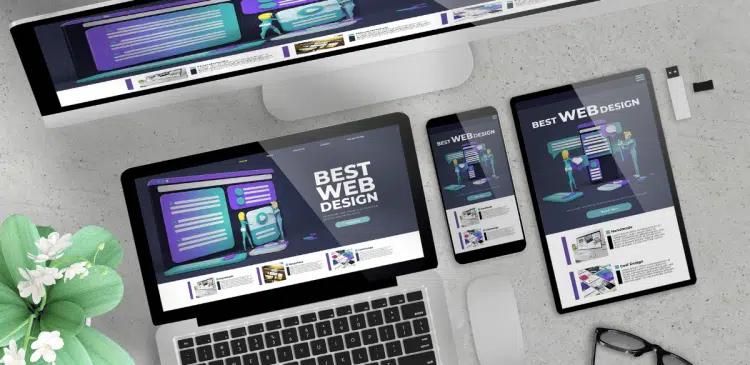What Are Common Web Design Mistakes to Avoid?

One of the strongest tools that a business or a brand can possess is a well-designed webpage. It is usually the initial impression of the customer and as we all know first impressions are important. It is also important to steer clear of the commonly made web design errors that make visitors flee regardless of whether you are developing a new or updating a web site.
This paper will discuss the most widespread web design errors and how you can prevent them to have a user friendly, interesting and successful website.
Poor Navigation
Confusing Menus
When people cannot easily locate what they need they will go away- in a flash. The design error that can be made the most is a confusing or cluttered menu of navigation. The visitors can be overwhelmed by too many choices or non- consistency in the layout.
How to avoid it:
- Keep with a direct top level navigation bar.
- Label familiar and simple words such as home, about, services and contact.
No Search Function
In the case of larger sites, it is frustrating to find out that there is no search bar. Tourists desire to have content in a hurry.
How to avoid it:
- Have a search box on the homepage.
- Make sure that it performs and gives pertinent results.
Slow Loading Times
Heavy Images and Scripts
When the site is beautiful, it does not make a difference when it takes long before it loads. In the world of fast digitalizing, slowness of your site will kill your traffic and rankings on the search engines.
How to avoid it:
- Reduce the size of pictures prior to uploading.
- Reduce the use of huge files, background videos and scripts that are not optimized.
- Test the speed of your site using such tools as Google PageSpeed Insights.
Not Mobile-Friendly
Neglecting Mobile Responsiveness
The mobile traffic makes up over fifty percent of web traffic in the web site that fails to fit into the smaller screen is a non-deal maker to a user- and a warning to Google.
How to avoid it:
- Apply responsive design systems such as Bootstrap.
- Check your site across the devices and screen sizes.
- Have tapable buttons and links.
Bad Use of Colors and Fonts
Poor Color Contrast
The choice of text and background color should not be too similar because your content will be difficult to read. Not only is it frustrating, but it is also not user-friendly to people who have vision problems.
How to avoid it:
- Have an extreme contrast between the background and the text.
- Do not use bright or complementary colors.
- Adhere to web accessibility standards (WCAG).
Too Many Fonts
It will not look professional to have five fonts on a single page as it can be confusing to the readers.
How to avoid it:
- Stick to 2-3 fonts maximum.
- Use clean and easy to read fonts such as Arial, Helvetica or Roboto.
Lack of Clear Call-to-Actions (CTAs)
No Direction for the User
Each page must have a meaning. When your visitors are not sure about what to do next, it could be to subscribe to a newsletter, buy a product, reach out to you, etc., you have lost a lead.
How to avoid it:
- Make easy and direct CTAs such as purchase now, get a quote or schedule a call.
- Locate CTAs at the top of the fold, and at the bottom of the page.
Overloaded or Cluttered Layout
Trying to Show Everything at Once
Websites that contain excessive content in terms of text, images, advertisements, and pop-ups are tiresome. You will not be able to involve visitors, on the contrary, you will be pushing them away.
How to avoid it:
- Allow room in your content using whitespace.
- Hone on the most important information.
- Maintain the layout of your layout.
Missing Contact Information
No Easy Way to Get in Touch
Unless your phone number, email or address is fast to locate, users will not have trust in your business or they will simply move on.
How to avoid it:
- Add a dedicated “Contact” page.
- Have several choices: phone, email, contact form and even live chat.
- Place a contact information in the bottom of the page to be seen on each page.
Ignoring SEO Best Practices
No On-Page Optimization
Design will not result in traffic. By failing to optimize your web site in search engines, you are just leaving out potential visitors.
How to avoid it:
- Include pertinent keywords in your headings, content and meta tags.
- Add alt text to images.
- Divide structure with H1, H2 and H3 tags.
- Create SEO-friendly URLs.
Auto-Playing Media
Videos or Audio That Start Automatically
One of the quickest methods of annoying the visitors is using auto-playing content and especially when it includes sound.
How to avoid it:
- Allows users to select the time of media.
- Automatically turn off videos and add play buttons.
No Analytics or Tracking
Flying Blind Without Data
Do you know what is working in your web site? And without tracking tools you are taking decisions blindly.
How to avoid it:
- Install such tools as Google Analytics and Google Search console.
- Track the actions of users and modify your content or design according to factual information.
Not Updating Content
Outdated Information
Your business will seem dormant due to stale content or old blog posts. Tourists can doubt you or believe that you have closed down.
How to avoid it:
- Be creative and refresh your content on a regular basis.
- Frequently verify your blog, product pages and contact information.
- Eliminate or update old promotions or seasonal information.
Inconsistent Branding
Mixed Messages Across Pages
Your web site is a part of your brand. When the logo, colors or tone vary per page, the page loses credibility and it becomes confusing.
How to avoid it:
- Consistency Use brand style guide.
- Use consistent tone of voice, color palette, as well as visual style.
- Make sure every single page matches your brand.

 Bill Yeager, Co-Owner of High Point SEO & Marketing in CT
Bill Yeager, Co-Owner of High Point SEO & Marketing in CT